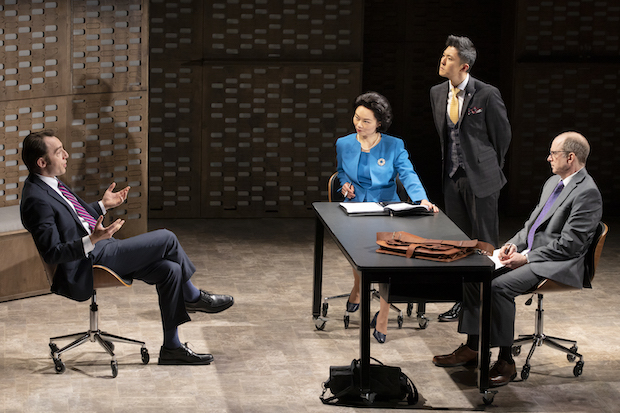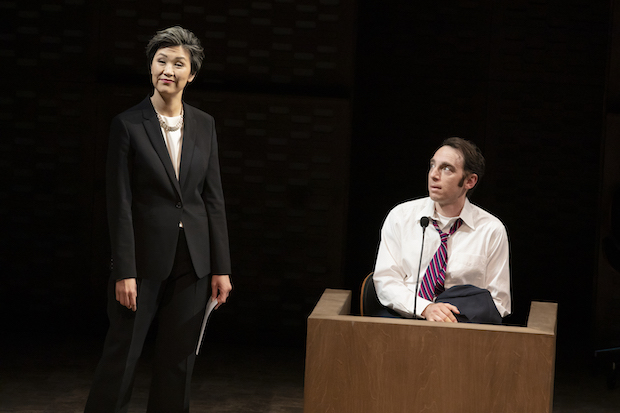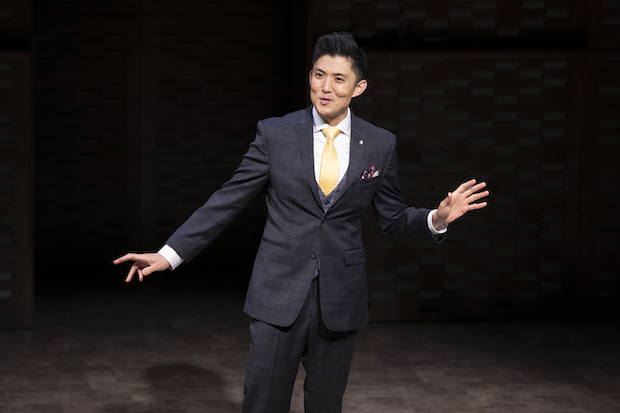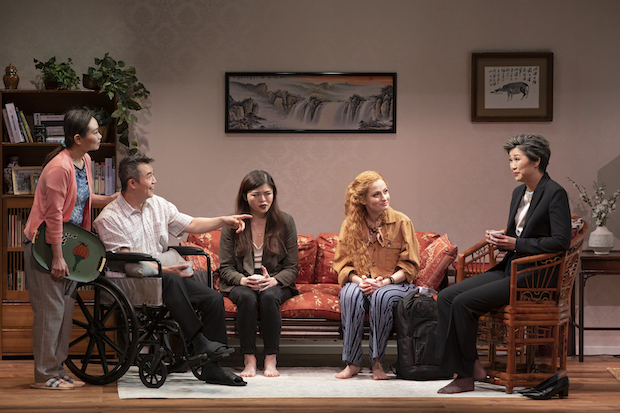Review: Golden Shield Tells of Chinese Communists and their American Capitalist Accomplices
Anchuli Felicia King’s play makes its American debut.

(© Julieta Cervantes)
One of the most powerful myths of the last several decades is that trade with the West would invariably lead to a freer, more democratic China. If the cult of Xi Jinping, China's draconian "zero-Covid" policies, and the mass detention of Uighurs haven't thoroughly disabused you of this notion, chances are you own a factory in Shenzhen. Or perhaps trade with China has made you so rich you just don't care about the consequences, embracing a kind of amoral libertarianism to justify your complicity with the crimes of the Chinese Communist Party.
That certainly seems to be true of Marshall McLaren (Max Gordon Moore), President of China Operations for the behemoth tech firm ONYS Systems and chief villain of Anchuli Felicia King's Golden Shield, now making its US premiere with Manhattan Theatre Club at New York City Center. His proudest achievement is making the Internet in China "four times faster." He did this by decentralizing the "Great Firewall," thereby making it more efficient for the government to spy on its citizens — and making himself very rich in the process.
But at least some of ONYS's reported $50 billion in annual revenue seems to be in jeopardy when American lawyer Julie Chen (Cindy Cheung) files a lawsuit on behalf of a group of Chinese dissidents whom the government targeted using ONYS technology. "Foreign citizens suing a multinational corporation. In a US district court," she tries to sell her wary partner, Richard (Daniel Jenkins). "It's the white whale of international humanitarian law."

(© Julieta Cervantes)
Like Captain Ahab, Julie pursues her white whale with maniacal abandon. Most likely to be harpooned is her own sister, Eva (an achingly vulnerable Ruibo Qian), whom she invites to China as a translator. Julie's Mandarin is almost nonexistent, and this seems like a nice bonding experience just months after the death of their tyrannical Chinese mother.
Together, they travel to Yingcheng to meet with Professor Li Dao (Michael C. Liu), who has been left wheelchair-bound following five years of detention for the crime of showing people how to tunnel under the firewall. Li is Julie's star witness, but his desire to shield his wife (Kristen Hung) from the full extent of his abuse proves to be a weak spot for the case – and Julie has little tolerance for weakness.
King has written a gripping drama for the age of globalization, with characters bouncing between Beijing, Melbourne, and Palo Alto. She lucidly conveys complicated technical issues of international law and online infrastructure, using them as a basis to examine more timeless questions about ambition and our responsibility to other people (especially our own siblings).
Director May Adrales delivers an appropriately fast-paced staging, with a rapid succession of scenes materializing on a set that looks like a modern tech or law office, but is full of surprises (design by the scenic collective, Dots). Sara Ryung Clement similarly finds plenty of room for individual expression within the confines of business attire. Lighting designer Jeanette Oi-Suk Yew and sound designers Charles Coes and Nathan A. Roberts help to transform the stage so that we leap across the planet in a flash. Adrales takes a script that could easily be a screenplay and manages to make it delightfully theatrical.

(© Julieta Cervantes)
King presents several scenes completely or partially in Mandarin, with a mysterious character called "The Translator" always onstage to help us understand. Played by Fang Du with impish charm and just a hint of magic, he is reminiscent of the Emcee in Cabaret — simultaneously omniscient and a part of the action. He not only translates from Chinese, but often conveys the subtext of English conversations, forging a relationship with the audience that we can never fully trust, but nevertheless come to rely on.
The other seven members of the cast keep us engaged with clever and nimble performances: After playing a bossy and big-haired Communist grandee (wigs by Tom Watson), Hung is practically unrecognizable as Li's reserved yet insistent wife. Gillian Saker similarly does double-duty as an Australian activist and as ONYS's smug chief legal counsel. Liu gives one of the most emotionally wrenching performances of the year as the professor. And in Julie, Cheung forcefully, terrifyingly embodies a compelling antihero for the New York audience — a girl boss lawyer on the right side of history who is generally unconcerned with the collateral damage caused by her righteous crusade.

(© Julieta Cervantes)
She's certainly a more complicated figure than McLaren, whom Moore nevertheless endows with the kind of detailed, linger-in-your-memory idiosyncrasies that make him such a perfect stage villain (as he was in Describe the Night playing a very different type of baddie). He gazes wildly into the distance as he has a revelation, drunk on the elixir of his own genius. Impatience drips from his smoky voice as he tries to share his insight with lesser mortals. And he stomps his feet like a cranky toddler when he doesn't immediately get his way. McLaren is thoughtlessly racist, emotionally stunted, and just plain greedy — like so many in the present American ruling class.
The events of Golden Shield take place from 2006 to 2016, which strangely feels like a more innocent time. As our country adjusts its relationship to the increasingly belligerent regime in Beijing, we ought to reserve some scorn for its Stateside accomplices.











